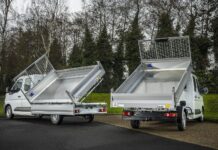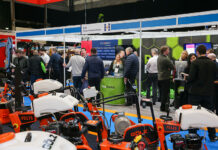
Gary Moug reports on the Bonnybridge business taking the welfare and tower light markets by storm
IN July last year, Dan Wharton used redundancy money to buy a mobile welfare unit and set up a firm called LOC Hire. Working out of his living room for the first two months, he gradually built up a network of contacts and started adding to his fleet.
Today, the firm has in excess of 60 welfare units, 100 tower lights and 45 portable toilets for hire, all of which are brand new. The business recently moved into new premises in Bonnybridge, with plans afoot to open two further depots next year.
It’s been an extraordinary success story, with Dan admitting even he is surprised at how quickly things have taken off.
“As recently as December last year, we still only had ten units,” Dan said. “It was really only in the New Year that things went ballistic. It’s very scary. It’s great, but it’s scary!
“I had worked in accommodation and plant for 25 years. I’m 50 this year so I just decided that if I was ever going to do anything myself, I had to go for it now.
“Accommodation and plant is so varied so I decided to specialise on the welfare and tower light products. I saw it as an area that was coming more and more into itself, and still very niche. That’s definitely proved to be the correct decision. The speed it has taken off has just been phenomenal.
“Lots of people are dealing in second-half equipment. I decided to go with new kit. My philosophy is really about giving someone a quality product so I decided to buy brand new. That seemed to work quite well, quite quickly. Within a couple of months of setting up, I rented a yard in Cumbernauld and a wee office.
“I took on my first employee in November 2014 to help with deliveries. We’ve now got three vehicles on the road and seven people working for us, with plans to add to this by Christmas.
“I’ve been really lucky in that the manufacturers I purchase from, Boss Cabins, have been great and saw our vision as well. They’ve worked closely with us, which has allowed us to expand.”
Dan believes his policy of shelling out for brand new products, rather than relying on second-hand goods, has been pivotal in LOC Hire’s success.
“The overall quality of our welfare units, and some of the innovation in them, is tremendous,” he said. “Our customer base is used to dealing with more mature units that have had a million coats of paint on them and maybe a new generator.
“Suddenly we’re coming up with products that are new and innovative. The thing about selling is you can send brochures and undercut rates all day. But for me, it’s about seeing it, feeling it and touching it. As soon as people see our units and get inside them, and see the quality of build, nine times out of ten we get a hire out of it.
“What we’ve also done, and we try to instil this right throughout our business with our staff, products and customers, is make it an inclusive thing. We try to provide a family business-type service. Everybody deals with everybody, everyone knows everyone.
“I always tell the guys to be confident enough to make a mistake. If someone asks if we can do something, make a decision. Go and do it for them. We’ll worry about the other side of it later on.
“Now that we’re really starting to build up our customer base, the feedback we’re getting is really positive. People are telling us it’s not always about the price and, in some cases it’s not even all about the product. It’s about the response that you get from us. Nothing’s an issue, nothing’s a problem. We’ll make it happen.
“Having invested heavily in new equipment, we find that we have very few issues when it comes to reliability and certainly the quality is very high. This is reflected in our utilisation, as reliability is a key focus for our cusomers.
“We’ve put a dozen new units into our welfare fleet in the past three weeks and every one of them is out on hire at the moment. Every time we think we might get a wee bit of respite, and I promise the guys they won’t have to work late the next week, it just goes and goes!”
Dan says the most popular product so far has been the LOC7, described as the UK’s most space efficient mobile welfare unit. It comfortably seats seven people and has a dedicated 40-litre storage capacity for each person.
“The products that are available in the marketplace generally at the moment are effectively six-man units,” Dan said. “Our first product is a seven-man unit. Just by reconfiguring the internals on it, we’re able to get another person comfortably in it.
“Thereafter what we’ve done is brought on a ten-man unit, a twelve-man unit and a fifteen-man unit. No one else has these products available in the size of fleet and availability. Before, people were taking multiple units if they had more than six people. Now if they have seven or eight people, or even nine or ten, they still only need to take one of our units. The cost in these units when you rent them is predominantly not the unit, it’s the generator. So as soon as you have multiple units, you have multiple generators. That’s what hikes the cost up and that’s where we’re able to save customers money.
“Our most popular product is the seven-man unit but what we’re now finding is that the 15-man unit is becoming more popular. That is for a number of reasons. Firstly, it competes very competitively pricewise against static welfare. Secondly, it offers much more space internally, including a separate office. You can get fifteen people in it and it’s towable. All our units are towable.
“We’ve grown our mobile welfare fleet quite dramatically. It’s difficult to know, because no one really gives this information out, but I would guess that in Scotland we’re probably the largest independent hirer of mobile welfare units now.
“In terms of size of fleet, we compete against even the biggest of firms.”
Dan, who has two young children aged three and two, laughs when I ask what his wife thought when he decided to set up on his own. “My wife is always 100% behind everything I do but there’s always a degree of worry about whether it will work,” he explained. “I met my wife through working in this industry so she understands the industry, but there’s always a degree of nervousness about the investment.
“Between our tower lights, welfare units, vehicles, etc, we’ve probably spent a million pounds one way or another. And still I have no one working in the office!”
That’s something Dan expects to change in the near future. In the past six months, the workforce has increased from two to seven people. Another string to LOC Hire’s bow is the fact they now service all of their own units too.
“The decision to service our units was again all about taking control and not being reliant on sub-contractors,” Dan added. “We had some potential customers who said they wouldn’t use us until we serviced ourselves, so we invested in a pumper wagon and employed a chap to do that.
“We cover the whole of Scotland and north of England. At the moment I’ve got a unit in Wick and two units down in Scotch Corner. We cover everywhere in between.
“We’re now looking at introducing satellite depots – one in Durham and one in the north of Scotland. At any one time we’ve probably got a dozen units on hire north of Dundee so it makes sense that we start looking to control that a bit more ourselves. I would like to see these up and running in both areas by spring next year.
“In the central belt it’s been really easy to find quality, experienced staff. Having worked in the industry for 25 years, I know a lot of people and most of the staff we’ve taken on are guys I already knew. In the early days, people probably wondered how long this would last. The first person I took on needed some persuading because he’d worked with another company for 25 years so to get him to jump to a brand new company was difficult, but it happened and that was one of the best things that happened to us from a staffing point of view.
“Now that people realise there’s something successful going on here, they’re approaching us and asking if there are any jobs going. We don’t have to go chasing people.
“I need staff who will come across to the customer base in the right way. I know lots of guys who are really good at what they do but it’s just a job to them. These people are of no interest to me. I want people who want to speak to customers and get involved. I’ve got a guy working for me just now as a supervisor who laughs all the time, and everyone talks to him and buys him cakes. That’s what we want.
“An old boss told me something once that is a bit clichéd and bit cheesy but it kind of rings true. He said ‘I want people coming to work whistling rather than leaving whistling’. That remark has always stuck with me. The bigger you get, the harder it is to keep that going but that’s the way it’s working for us. I love that.”
LOC Hire also has a new fleet of tower lights, which Dan says are packed full of innovative features and generating a lot of interest as winter approaches.
“We’ve bought a product called Heimdall, which means the Norse God of light,” Dan said. “We’re getting into a busy market so we needed a way to stand out. As with the welfare units, we can buy new, which is what we’ve done. But I was also looking for innovation. I don’t want to go into the marketplace with an average product and tell people we’ll undercut everyone just to get some business. It’s a bit of a hard sell at the moment because to a lot of people, a tower light is a tower light. But the Heimdall is innovative stuff. For example, a standard tower light unit will have four legs for stability, but every manufacturer has designed them to be manually operated. You basically pull a pin out and have to heave this big leg out.
“With the Heimdall, the legs are hydraulically moved. We use a remote controlled panel that drops the legs down. It also has a stability system, which no one else has. If you set up a tower light with three legs on solid level concrete and one leg on gravel, the rain can come along and wash the gravel down. What our system recognises is that the unit is under loaded on one leg and will actually drop the tower light down for safety to a three-metre height. The centre of gravity has been reduced, which makes it a very safe unit.
“In high winds, it will also recognise the windspeed and drop the tower light again. Heimdall have told me, and I believe them, that it’s the safest tower light in the marketplace today. It’s fantastic and what we’re finding is that we don’t have to go out and sell on price. In fact, people will pay a premium for it. We have introduced this particular tower light into our fleet as we feel it ticks many boxes. 1 – it’s a tower light. 2 – It’s safe. Importantly, I feel that is the key to its success – safety. Once people understand how safe they are, I believe it will be the first choice for all companies who are serious about offering the safest workplace possible to their employees.”
Proving the firm has no interest in standing still, LOC Hire has recently signed a deal with plant giants Garic to be their new Scottish agents.
“The partnership between the two companies offers a fanstastic opportunity for us to expand and grow our product and client base here in Scotland,” Dan added.











